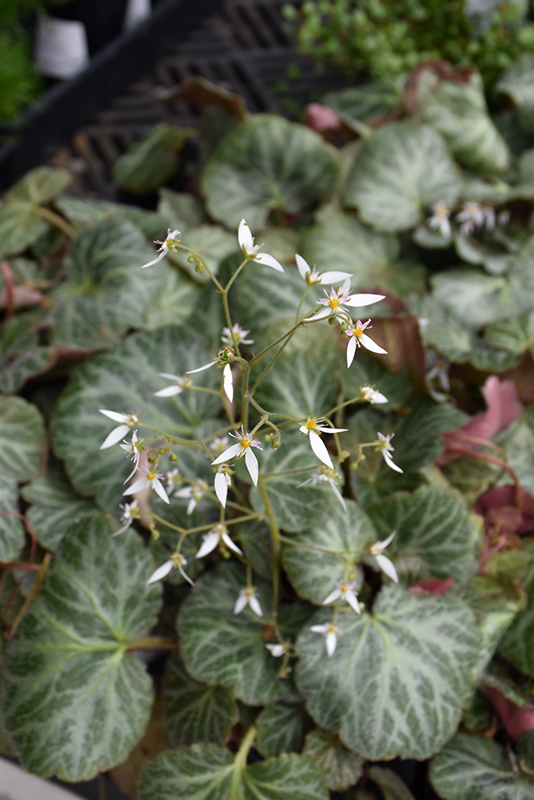Plant Height: 6 inches Flower Height: 15 inches Spacing: 10 inches
Sunlight:
Other Names: Strawberry Begonia, Creeping Rockfoil Description: Neither a strawberry or begonia, but has characteristics of both plants; a beautiful, ground spreading plant with rounded leaves that turn golden in sunlight; shaded leaves tend to be more green; dainty white flowers on tall stems in late spring Features & Attributes Creeping Saxifrage has masses of beautiful spikes of white star-shaped flowers with gold eyes and hot pink spots rising above the foliage from mid spring to early summer. Its attractive serrated round leaves remain dark green in color with distinctive silver veins throughout the year. This is an herbaceous evergreen houseplant with a spreading, ground-hugging habit of growth. Its relatively fine texture sets it apart from other indoor plants with less refined foliage. This plant should not require much pruning, except when necessary to keep it looking its best. Planting & Growing When grown indoors, Creeping Saxifrage can be expected to grow to be only 6 inches tall at maturity extending to 15 inches tall with the flowers, with a spread of 12 inches. It grows at a medium rate, and under ideal conditions can be expected to live for approximately 10 years. This houseplant performs well in both bright or indirect sunlight and strong artificial light, and can therefore be situated in almost any well-lit room or location. It does best in average to evenly moist soil, but will not tolerate standing water. The surface of the soil shouldn't be allowed to dry out completely, and so you should expect to water this plant once and possibly even twice each week. Be aware that your particular watering schedule may vary depending on its location in the room, the pot size, plant size and other conditions; if in doubt, ask one of our experts in the store for advice. It is not particular as to soil type or pH; an average potting soil should work just fine. There are many factors that will affect the ultimate height, spread and overall performance of a plant when grown indoors; among them, the size of the pot it's growing in, the amount of light it receives, watering frequency, the pruning regimen and repotting schedule. Use the information described here as a guideline only; individual performance can and will vary. Please contact the store to speak with one of our experts if you are interested in further details concerning recommendations on pot size, watering, pruning, repotting, etc. -- THIS IS A HOUSEPLANT AND IS NOT MEANT TO SURVIVE THE WINTER OUTDOORS IN OUR CLIMATE --![]()
![]()
![]()
![]()
![]()
![]()
![]()
![]()
![]()
![]()
![]()
![]()
Characteristics
Applications
Ornamental Features
This guide is an online resource representing many of the varieties that we carry over the course of the season, and is intended for informational purposes only. Inventory varies seasonally, so we cannot guarantee that every plant will be in stock at all times - please contact the store directly for current availability. It does not include our entire selection of plants, so be sure to visit our store to see varieties that may not be represented on this list.



